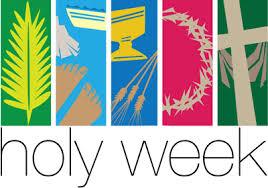Sermon - Apr 15, 2019 Palm Sunday: Parade, or protest march?

Palm Sunday: Parade, or protest march?
We’ve come to this moment in an unusual fashion. Temptations and warnings and parables and then last week’s lesson in extravagance…and through it all the figure of Jesus tries (in vain) to tell his friends that this little exercise in social change is going to come to an abrupt and sinister end.
Right now, of course, none of those warnings matter. The movement has past the point of no return. They storm the holy city with their hero on a ‘borrowed’ colt, laying coats along the trail, singing and shouting and hoping against hope that this is the moment - now is the time.
As it happens they are right and wrong - simultaneously. (Think Schrodinger’s cat.) This is the moment - the moment that we recognize as the beginning of something remarkable and new - something that must be played out to the full extent of human misery before we can understand (or even see) the benefit. The cheering crowds will all be scattered; some will be despondent, others jubilant - at this moment it is nearly impossible to know who’s who. And only later - three days after this all comes to a head - will these events begin to make any sense at all to anyone.
Luke’s account of the parade into Jerusalem is missing something - if you were listening closely, you’ll know that there are no palm branches mentioned. There are (suddenly) a “multitude” of disciples “praising God joyfully…for all the deeds of power they had seen.” We gladly accept these celebratory elements of the story (no matter which gospel we choose for the day).
We have our palms - joyful singing - we see (in the gospel) what we want to see; a crowd of faithful people making their way to Jerusalem for the Passover.
If we ignore everything that came before, and block from our minds what we know is about to happen, we can imagine this as a peaceful, celebratory event staged by Jesus’ friends and followers who were caught up in the spirit of pre-passover euphoria. But there is nothing benign about this little parade. It’s a protest march.
There are elements of planning (go into the village…untie the colt…if anyone asks you what you’re doing just say this “the Lord needs it.”). They know the city will by a busy place - they know that they will attract attention. They imagine that they are moving towards a political upheaval - hailing the king (Jesus) who comes in the name of the Lord - that is rooted in religious revivalism.
This confident group of marchers is sure that they have it right. They have seen miracles - they know what they know. And in spite of Jesus’ dire warnings about arrest, betrayal, death and resurrection (Luke 18: 31-34), they imagine that their actions will somehow change all that - that their witness might change the minds of the miserable, secular government - or somehow win back those so-called religious leaders to the purity of the faith. Idealism is not a bad thing - and it’s not a new thing - but it doesn’t stand up well to tyranny (political, social or religious).
So the donkey is ridden and the songs are sung and heads are turned in the fair city, and it does catch the attention of the powerful.
The Pharisees - those whose efforts have gone towards living faithfully under Roman rule - those men (all men) who were working both sides of the street, as it were - come to Jesus and ask Jesus to ‘order your disciples to stop…”. Stop singing - stop marching - stop crying for such radical change…it’s dangerous - it might cost us such freedoms as we already have. Stay quiet - stay safe - go along and get along seems to be the message. Whatever else the Pharisees were, it is likely that they were also genuinely concerned about the welfare of the worshipping community. And Jesus says what resonates most (for me) in this moment. “I tell you, if these were silent, the stones would shout out.”
This is not a call to silence in the face of overwhelming tyranny or brutal injustice - quite the opposite. I have been drawn towards protests for many reasons, and those protests have provoked political and religious arguments.
In the spirit of those marching alongside that borrowed colt, I can be an idealist of the highest order, sure that my argument - my presence - my convictions will somehow change minds and thus, change the world. But in the Spirit of Jesus, I am also a faithful pragmatist - knowing that there are some serious hurdles to encounter before the tension can be relieved. That we are hearing this gospel lesson in the midst of the social, political and personal turmoil of a very nasty election campaign is a reminder that Scripture speaks to God’s perpetual involvement the human condition. Complications arising at the intersection of religion and politics is inevitable. Tempers flare, violence is always a possibility, in extreme cases, people die. But in Jesus, God brings the ‘argument’ to a radically different conclusion.
This week we embark on the worst case scenario. In the midst of the Holy celebrations, violence intrudes and the protesters will be scattered. Their leader will suffer the shame of arrest and a criminal’s death. But unlike every protest before or since – and to the everlasting hope of all of us who long for something other than perpetual conflict – God is in control of this event. God has a point to make – a statement that will not be silenced. For at the end of this worrying week, the Lord will be raised, and the promise of peace will continue to encourage those who dared to sing Hosanna.
Soon - but not just yet. Amen
 St. John's
St. John's




